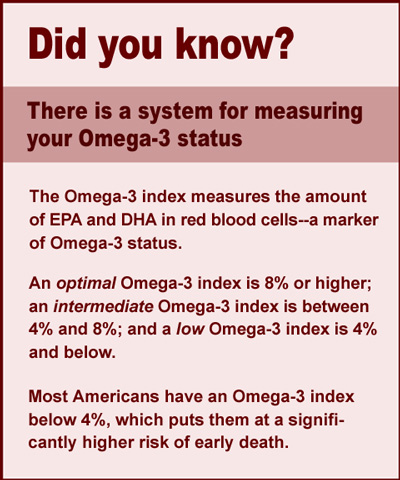When it comes to critical nutrients for supporting lung health, most people think of vitamins C and D. However, according to new research, Omega-3 fatty acids are another group of nutrients that are also critical for maintaining lung health.
Omega-3 fatty acids are found in seeds, nuts, seaweed, fatty fish, algae and supplements.
Researchers say the study once again underscores the importance of including Omega-3s in the diet, especially given that most Americans are extremely deficient in their intake of the essential nutrient.
Guidelines and deficiencies
While the U.S. government still has not established an official recommended daily allowance for Omega-3s, the U.S. Department of Agriculture’s Dietary Guidelines for Americans does recommend that people eat at least two servings of fish per week.
Most Americans do not meet even this meager guideline; moreover, vegetarian consumers typically do even worse since they don’t consume the rare plant foods that contain both DHA and EPA Omega-3s—such as algae and seaweed.
The new evidence emerged from a large, multi-faceted study conducted at Cornell University, Ithaca, New York. The study was conducted on healthy adults, and was funded in part by the National Institutes of Health (NIH).
The results were published in American Journal of Respiratory and Critical Care Medicine in June, 2023.
“We know a lot about the role of diet in cancer and cardiovascular diseases, but the role of diet in chronic lung disease is somewhat understudied,” said corresponding author Patricia A. Cassano, PhD, director of the Division of Nutritional Sciences at Cornell. “This study adds to growing evidence that Omega-3 fatty acids, which are part of a healthy diet, may be important for lung health too.”
Omega-3s don’t get the attention other antioxidants do because they’re not recognized as anti-inflammatory to the same degree as nutrients like polyphenols and carotenoids. Some past studies have suggested that Omega-3 fatty acids may be beneficial; however, robust studies on the Omega-3/lung health association have been lacking… until now.
Two-part study
To document a link, researchers developed a two-part study that tracked Omega-3 fatty acid levels in the blood and lung function over time in a large number of study participants.
“The two-part approach of combining a longitudinal study with large genetic analysis was to ensure any association we found was consistent across different analytic methods and backed by as much data as possible,” Cassano stated.
Researchers specifically evaluated four different Omega-3 fatty acids: alpha-linolenic acid (ALA), docosapentaenoic acid (DPA), docosahexaenoic acid (DHA) and eicosapentaenoic acid (EPA).
In the first part of the study, the researchers conducted a longitudinal, observational trial involving 15,063 Americans from the NHLBI Pooled Cohorts Study.
The NHLBI study is a large collection of NIH-funded studies that helps researchers study the risk for chronic lung disease in a substantial pool of participants.
The researchers followed participants for an average of seven years, a substantial time frame that lends credibility to the study results. Some participants were followed as long as 20 years.
The results of the first part of the study showed that higher levels of Omega-3 fatty acids in a person’s blood were associated with a reduced rate in the decline of lung function that is expected as a person ages. The researchers reported the strongest prevention appeared to be provided by DHA.
Second part
In the second part of the two-part study, researchers analyzed genetic data from a large study of European patient-participants. This analysis included a whopping 500,000 participants from the UK Biobank.
Researchers studied certain genetic markers in the blood as an “indirect measure” for how dietary Omega-3 fatty acid levels correlated with lung health.
The results of this detailed analysis also showed that higher levels of Omega-3 fatty acids were associated with better lung function.
One limitation of the study, commented on by researchers, is that it only included healthy adults.
With this in mind, researchers are now collaborating with the COPDGene study to examine blood levels of omega-3 fatty acids in relation to the rate of decline in lung function among people with chronic obstructive pulmonary disease (COPD).
The new research would include heavy smokers and will be a better indicator of the benefits of Omega-3s for therapeutic treatments.
A full spectrum of Omega-3 essential fatty acids can be found in Optimal E.F.A. by Optimal Health Systems.
Click the banner ad on this page, or visit the product info page here.
– – –
Sources: American Journal of Respiratory and Critical Care Medicine, NHLBI Pooled Cohorts Study, Wikipedia-Omega-3 fatty acid.



